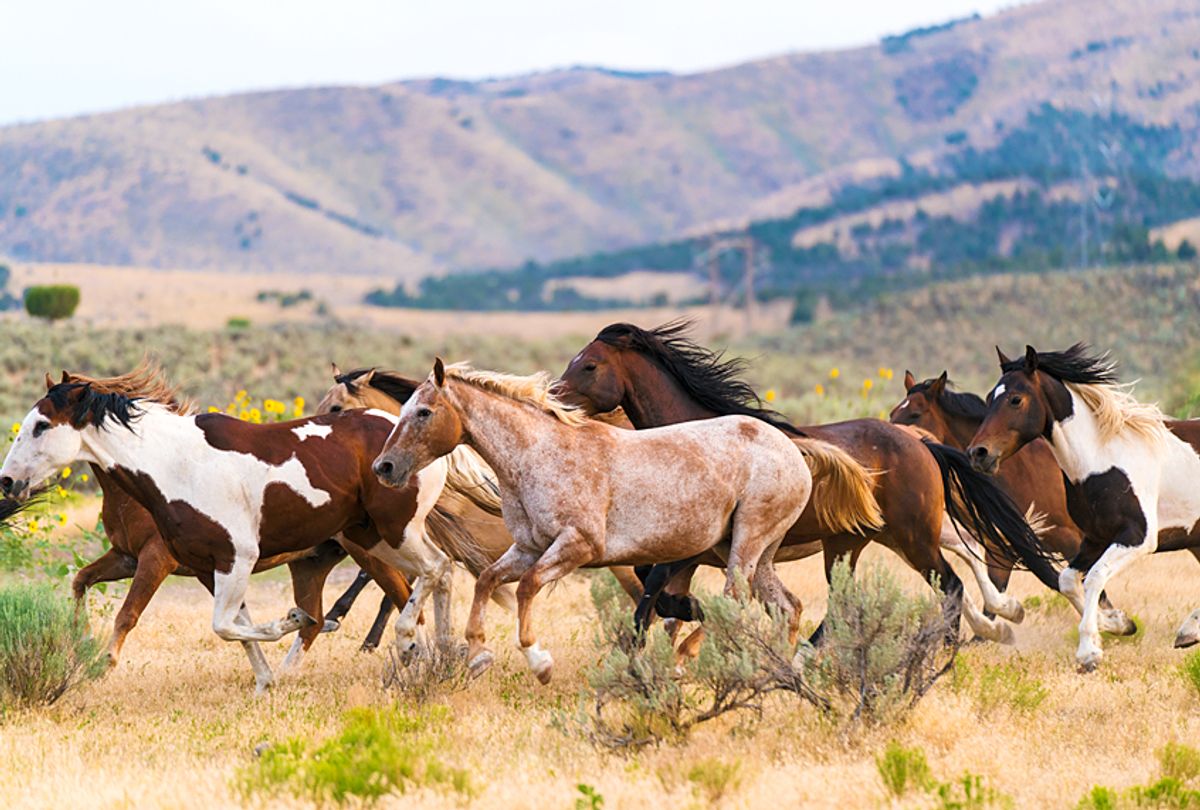Thousands of wild horses' lives are at stake as the government considers ways to control their population and limit their impact on public lands.
Already, many animal rights activists have taken issue with U.S. Bureau of Land Management's (BLM) tactic of herding wild horses with helicopters and sometimes confining them permanently to expensive holding facilities. Now that same federal agency is petitioning for new regulations and budget allowances that would enable the slaughtering of those animals.
"The BLM, the very agency in charge of protecting them, is asking Congress for permission to kill them," Simone Netherlands, an animal rights activist and a spokesperson for the American Wild Horse Campaign, told ABC News.
The idea is disturbing, yes, but the issue is not so simple. According to ABC News, there are approximately 75,000 wild horses living on public lands, most of them located in government-controlled territory in the American West. Without natural predators, their numbers have greatly expanded in the last half century, putting them in conflict with others who use the natural resources on that federal property.
At this time, the BLM leases 60 percent of its land to ranchers, who count on the grasses the wild horses eat to feed their livestock. Naturally, these small (and sometimes large) business owners want the horses moved off the land completely in order to keep their often thin financial margins stable and, one might guess, keep prices for domestic beef down, at the consumer level.
Already, some captured wild horses are placed into what's called the "adoption circuit," a system that allows ranchers and enthusiasts to either house or domesticate the animals on private land. But that serves to help a thin fraction of the total number of horses. The majority are herded into holding facilities.
"There are over 45,000 wild horses currently in holding areas, costing taxpayers about $50 million annually," ABC reported. "It's an expense that the U.S. Department of Interior sought to address in its 2018 budget by lifting regulations that prevent slaughtering wild horses."
Beyond being horrified by the idea of slaughtering wild horses, activists worry that the practice could cause the animals, sometimes called mustangs, to go extinct.
"They've stockpiled wild horses in holding pens," Netherlands told ABC, "and so now what are they going to do with all the horses that they've stockpiled? The adoption rates are not high enough so they can't adopt them all out. So now we have a bunch of wild horses that the taxpayers are paying for and holding facilities and their solution is kill them."
BLM counters that the natural resources on the land under BLM management isn't sufficient to support the lives of all the wild horses roaming free in the West. "There's three things that wild horses need: food, water and obviously space," Lisa Reid, a BLM spokesperson, told ABC. "As you can see we do have millions of acres out here, but not every acre is producing viable forage for the horses. So you know just as with any type of species they have to be managed just so that they don't become . . . overpopulated and diseased."
Reid added that "The Bureau of Land Management is a public agency. We have to answer to all groups . . . So we have to try and find that balance to make sure that we can do what's best for the horses." She says, according to BLM, wild horses "are overpopulated by sometimes 300 percent on most of our herd management areas."
It's notable that the Department of the Interior is now under the control of the ardently pro-business, anti-environmental Ryan Zinke, an appointee of President Donald Trump, who often seems to value what industry can derive from publicly protected natural resources above those natural resources themselves. Acting BLM chief Brian Steed also seems to lean in that direction. That said, there is no evidence that either forced this initiative.
Now Congress has to decide if the proposed regulations and allocations that would allow for the cull will pass as part of the Department of the Interior's budget.
Ellen Price, who owns a ranch in California that takes in and trains some of the wild horses, tells ABC that she hopes people will understand that these horses "have value." The big picture, she said, is that "wild horses need to stay in the wild on public lands."
This brewing battle in Washington points to many things: Humanity's inability to operate in sustainable ways, the problems eating meat causes the world and our misunderstanding of ecologies (after all, it was humans who first brought horses to this continent and then mismanaged them).
More than anything else, though, it points to an ongoing war of priorities, one in which the current government seems to favor business over more universal concerns and in which bureaucracy constantly fails almost all living things — humans being the most tragic and important examples.

Shares